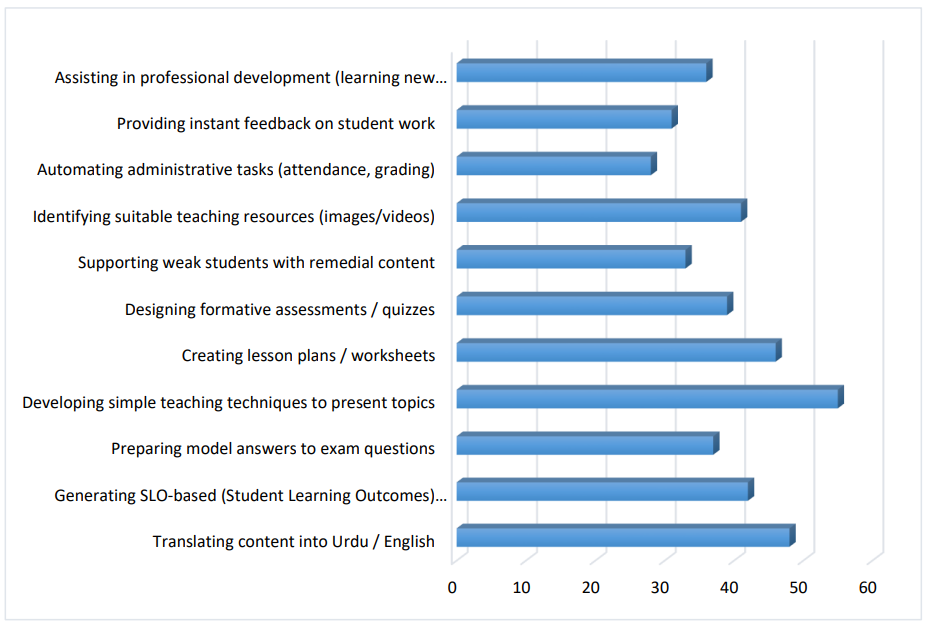Integrating Human Pedagogy and Artificial Intelligence in Teaching Practices
DOI:
https://doi.org/10.62497/irjed.163Keywords:
Teacher Perceptions, Artificial Intelligence, AI, Education, Human Pedagogy, Teacher Training, Educational Technology Integration, ChatGPT, Teaching PracticesAbstract
Introduction: The rapid development of artificial intelligence (AI) in education has brought both benefits and challenges, but still there is a limited research done on how AI can be integrated with human pedagogy. This study aims to explore how Integrating human pedagogy and AI can improve teaching practices without affecting teacher-student interaction.
Materials and Methods: This study used descriptive mixed-methods methodology. 100 teachers from ten government schools in Karak, Pakistan, were taken as a sample. They filled a validated questionnaire containing both open-ended and Likert-scale items. Quantitative data were analyzed using descriptive and inferential statistics, while qualitative responses were examined through thematic analysis to ensure validity and reliability.
Results: Most teachers reported using ChatGPT to plan and organize lessons and they believed that AI improved student engagement, assessment, and personalized learning. However, there is a fear of major challenges including lack of training, limited access to technology, and privacy concerns. Secondary school teachers reported greater benefits from AI than those of primary teachers.
Conclusion: These findings shows that with clear policy, teacher training, and equal access to digital resources, integrating AI with human pedagogy can create more personalized, creative, and inclusive learning environments in Pakistan.
References
Alghamdi, S. A., & Alashban, Y. (2024). Medical science students' attitudes and perceptions of artificial intelligence in healthcare: A national study conducted in Saudi Arabia. Journal of Radiation Research and Applied Sciences, 17(1), 100815. https://doi.org/10.1016/j.jrras.2023.100815
Chen, J., Li, K., Zhang, Z., Li, K., & Yu, P. S. (2021). A survey on applications of artificial intelligence in fighting against COVID-19. ACM Computing Surveys, 54(8), Article 158, 1–32. https://doi.org/10.1145/3465398
Chen, L., Chen, P., & Lin, Z. (2020). Artificial Intelligence in Education: A Review. IEEE Access, 8,75264–75278. https://doi.org/10.1109/ACCESS.2020.2988510
Holmes, W., & Tuomi, I. (2022). State of the art and practice in AI in education. European Journal of Education, 57(4), 542–570. https://doi.org/10.1111/ejed.12533
International Conference on Artificial Intelligence in Education (AIED). (2021). Artificial intelligence in education: 22nd International Conference, AIED 2021, Utrecht, The Netherlands, June 14–18, 2021, Proceedings, Part II. Springer. https://doi.org/10.1007/978-3-030-78292-4
Khan, S. A. R., Zia-ul-haq, H. M., Umar, M., & Yu, Z. (2021). Digital technology and circular economy practices: A strategy to improve organizational performance. Business Strategy & Development, 4(4), 424–436. https://doi.org/10.1002/bsd2.176
Luckin, R., Holmes, W., Griffiths, M., &Forcier, L. B. (2016). Intelligence unleashed: An argument for AI in education. Pearson. https://www.pearson.com/content/dam/one-dot-com/one-dot-com/global/Files/about-pearson/innovation/open-ideas/Intelligence-Unleashed-Publication.pdf
Luckin, R. (2018). Machine learning and human intelligence: The future of education for the 21st century. Routledge.
Mollick, E. R., & Mollick, L. (2023, March 17). Using AI to implement effective teaching strategies in classrooms: Five strategies, including prompts (The Wharton School Research Paper). SSRN. https://doi.org/10.2139/ssrn.4391243
Molnar, M., Orosz, G., & Dienes, Z. (2021). The psychological implications of AIassisted education: Opportunities and challenges. Computers & Education, 159, 104013.7.
Nemorin, S., Vlachidis, A., Ayerakwa, H. M., & Andriotis, P. (2022). AI hyped? A horizon scan of discourse on artificial intelligence in education (AIED) anddevelopment. Learning Media and Technology, 48(1), 38-51.https://doi.org/10.1080/17439884.2022.2095568
Obidovna, D. Z. (2024). The pedagogical-psychological aspects of artificial intelligence technologies in integrative education. International Journal of Literature and Languages, 4(3), 13–19. https://doi.org/10.37547/ijll/Volume04Issue03-03
Prothero, A. (2023, April). Will artificial intelligence help teachers or replace them? Education Week. Retrieved from https://www.edweek.org/technology/will-artificial-intelligence-help-teachers-or-replace-them/2023/04
Qadir, J., Islam, M. Q., & Al-Fuqaha, A. (2022). Toward accountable human-centered AI: Rationale and promising directions. Journal of Information, Communication and Ethics in Society, 20(2), 329–342. https://doi.org/10.1108/JICES-06-2021-0059
Qureshi, I. (2025). The impact of AI on teacher roles: Towards a collaborative human-AI pedagogy. AI Edify Journal, 2(1). University of Sindh, Jamshoro.
Sharma, S., & Kumar, N. (2023, September–October). The future of education: Implications of artificial intelligence integration in learning environments.
Selwyn, N. (2019). Should robots replace teachers? AI and the future of education. Social Policy and Society, 18(4), 1-15.
Selwyn, N. (2019). Should robots replace teachers? AI and the future of education. British Journal of Educational Technology, 50(3), 1195-1204.
Selwyn, N. (2022). The future of AI and education: Some cautionary notes. European Journal of Education, 57(4), 535–541. https://doi.org/10.1111/ejed.12532
Ullah, F., Haydar, B., & Arslan, M. F. (2024). Bridging Theory and Practice: AI Applications in Learning and Teaching in Pakistan’s Education System. Jahan-e-Tahqeeq, 7(3), 180-204. https://doi.org/10.5281/zenodo.13337553
Walton Family Foundation. (n.d), Voices of Gen Z Study. Gallup.
Zawacki-Richter, O., Marín, V. I., Bond, M., & Gouverneur, F. (2019). Systematic review of research on artificial intelligence applications in higher education. International Journal of Educational Technology in Higher Education, 16(1), 1-27.

Downloads
Published
Issue
Section
License
Copyright (c) 2025 Authors

This work is licensed under a Creative Commons Attribution-NonCommercial 4.0 International License.
